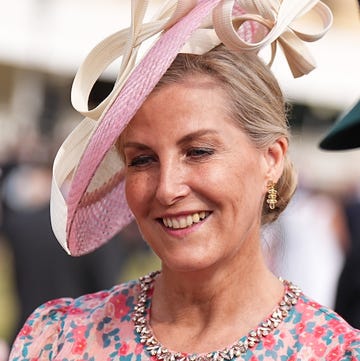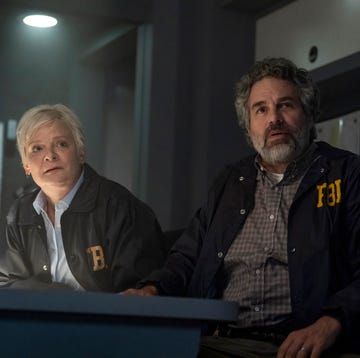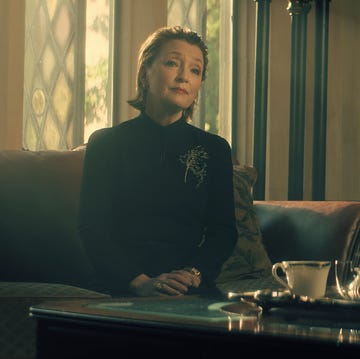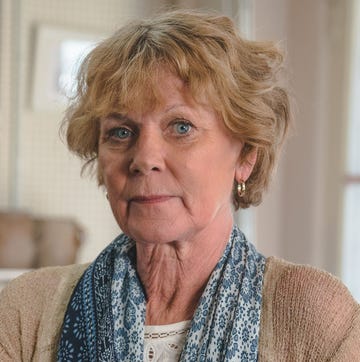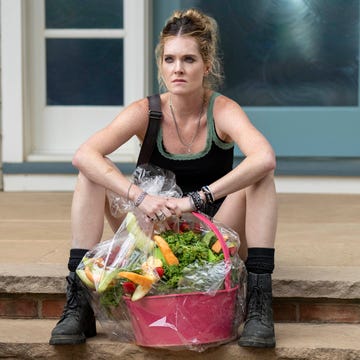As a woman, I’ve become increasingly frustrated about the lack of respect given to women’s health – and this has been exacerbated by my personal experience. I’ve been ignored, dismissed and told, ‘You’re fine, don’t worry about it. You’re making a fuss about nothing.’ I’m not a medical expert and I would never claim to be.
However, I am good at speaking up for myself. We have to learn to advocate for our own health, and I was very conscious that I wanted my book ‘It’s Probably Nothing’ to share that experience. ‘This happened to me – has it happened to you, too?’
I’ve struggled with menstruation issues from the day I started my period and I was told by my doctor on many occasions that it was normal. On reflection, that was just the start of my experience of being dismissed.
Another example was an agonisingly painful IUD (coil) fitting in my 40s. I’d been advised to take painkillers but was given no warning that some women can find it excruciating. I fainted twice on the table after the procedure and was left feeling violated, weak and angry. Then, a couple of years later, a gynaecologist diagnosed me with adenomyosis – where the lining of the uterus starts growing into its walls – and advised me to have a hysterectomy to stop the bleeding. I resisted – I didn’t want to go through a major operation and potentially early menopause, especially as there was no guarantee it would stop my symptoms.
Through all of this, there’s one particular moment that stands out. Between gynaecology appointments, I had a flare-up. I started to feel faint and dizzy with severe abdominal cramping. Within 20 minutes, this developed into extreme pain, which left me doubled over. I had to be helped upstairs to my bed and once there, was physically turned over by my partner as I couldn’t move myself. The bed was drenched in sweat. I was screaming – and I’m not a screamer. I couldn’t speak. I’ve never known pain like it – and fear… I’ve never experienced fear like that, where I just didn’t know when it was going to end.
My partner called an ambulance, but it never came; it was a Saturday evening and I wasn’t considered a priority. Six hours later, a paramedic called back and told me, ‘If it happens again, take two paracetamol.’ I was so offended. It showed so little respect and understanding for a grown woman who had explained her condition and who knows her own body. I was exhausted. This pain in my abdomen was excruciating and to be told to take two paracetamol if it happened again was shocking to me.
As women, we’re not expected to call stuff out. A watershed moment for me was the release of the 2024 Women and Equalities Committee report into women’s reproductive health conditions, which said medical misogyny exists. This is happening. This is a fact. Today, we have a name for it and we can be empowered to do something about it. We can call it out for what it is. We can say, ‘You’re dismissing me. You’re dismissing me because I’m a woman. You’re dismissing me because you think I’m not important enough to be listened to.’ I hope the very act of opening ‘It’s Probably Nothing’ is an act of empowerment.
Second-class treatment
The 2024 Women and Equalities Committee report concluded: ‘Women are being told that symptoms such as heavy, painful bleeding and incontinence are “normal”, that they are either too young to have a condition or too old to expect treatment.
As a result, women and girls are making repeat GP visits and ending up in A&E as their conditions worsen and become more complicated to treat.’ The thing to bear in mind is that, historically, women haven’t been medically treated as people with female bodies but as second-class men. So throughout history, women’s pain and health issues have often been dismissed. But we know our bodies. We know when something isn’t right and that knowledge needs to be respected.
For 32 years, I knew that I had very uncomfortable, painful, debilitating, crippling periods. I didn’t know it was wrong. When I visited my GP, he asked what level my pain was. I remember saying about a six. He said, ‘But you’ve said you’re vomiting and you’re passing out and you’re cramping and you’re bent over. That’s a 10.’ I remember being examined and leaping off the bed because of an ovarian cyst. The doctor said to me, ‘You just told me your pain is a five. Your pain is a nine, and you need to go to hospital now.’ That’s not about having a high pain threshold. It’s about pain becoming normalised for the person living with it.
We have to really think about different ways of registering what’s normal and what isn’t. Is your pain impacting your life? Is it negatively affecting your health? Is it stopping you from being the best you can be? Is it stopping you from chasing that job or spending time with your children? We need to understand that if our health is diminishing us, that’s when we ask for help.
Then there’s testimonial injustice – when your testimony is lessened because of social factors. You’ve probably heard of the team-building exercise where everyone lines up and the facilitator will ask the group, ‘Who went to state school? Put your hand up, take a step back. Who lived in a family where benefits were claimed? Take a step back,’ and so on. These are the real starting points in your career – not the original line-up.
It’s exactly the same with health. Black women are more affected by fibroids. There’s not enough research done into it to see why that happens. But more importantly, why is that not better known? For my book, I interviewed a woman called Dawn, who was complaining about uterine pain, and her fibroids were missed. Or look at Angelina’s story: a midwife spotted a problem with her cervix and said she should receive a postnatal check, but as Angelina was a traveller, an assumption was made that she didn’t have a fixed address and the letter was never sent. As a result, a cancer diagnosis was missed.
Some people recognise me because I’m on the telly, but I’m also very conscious that if I turn up in a hoodie, trainers and jeans, there will be an assumption that I’m not educated. I spoke to another woman who told me that her mum’s a doctor, but she still used to dress more smartly when she went to the GP because she knew she’d be taken more seriously. I’m not saying dress up to go to the doctor – I certainly don’t! However, I am saying be aware of how you could be perceived and be prepared to fight your corner because of that.
It all starts with the GP
By booking that appointment in the first place and taking care of our health, we’re not just protecting our bodies. We’re protecting our families – our place in their lives, with our future selves. So, write down your symptoms. This isn’t just when it comes to gynaecological health; this is if anything is happening that makes you think, ‘Oh, that’s a bit sore.’ Or, ‘That’s actually happening more and more frequently.’ Write it down. Track it.
Have evidence of where your life is being impacted. Show it to the GP. Your GP appointment should be a partnership. You cannot walk into a doctor’s surgery and say, ‘My knees are hurting. Can you fix them?’ You need to tell your doctor how it’s affecting you, exactly when it happens and how it feels. Doctors can’t read your mind. The more information they have, the better.
My adenomyosis won’t be fixed in my lifetime. They won’t find a cure because they don’t even know what caused it. They still don’t know why women have endometriosis. I don’t have control of my health, but I do have control over making sure I can get the best healthcare available for my condition and for my age.
I don’t want to be angry any more; I want to be heard without having to cry, beg or be made to feel weak. I want to be listened to. So many women before us have fought to be heard – so many continue to do so. We don’t choose to fight – we’d rather not fight. We need to trust our own instincts on health and have the confidence to keep pushing for answers.




